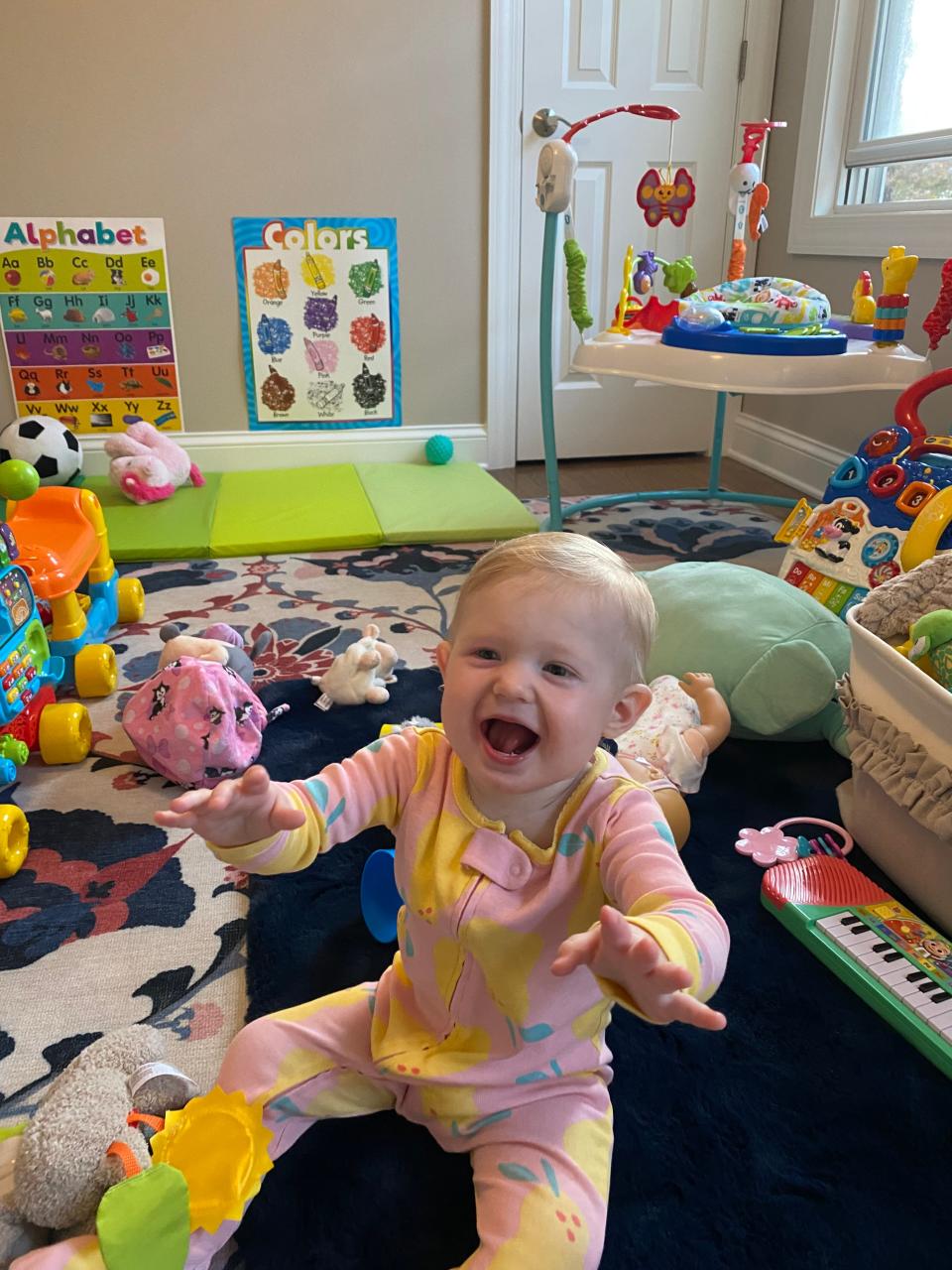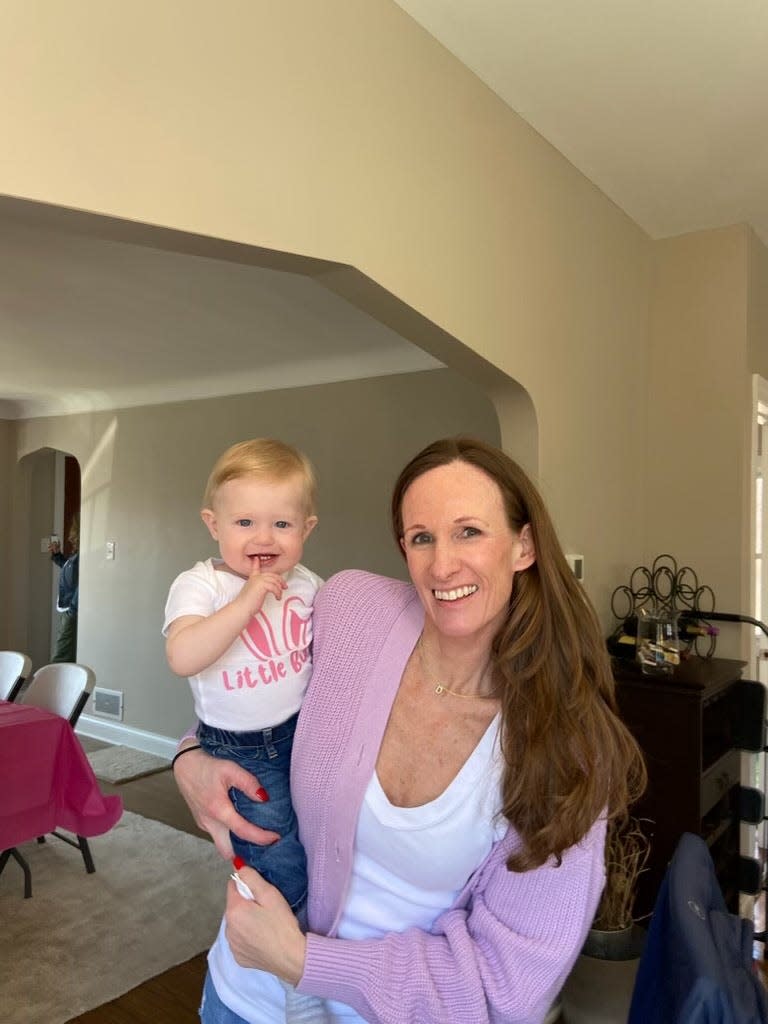Pregnant and over 40? You aren't alone. More women are becoming later-in-life moms.
- Oops!Something went wrong.Please try again later.
At 45 years old, Kate DeGaetano wanted to be pregnant more than anything in the world. But the thought also terrified her.
She worried about having the strength to carry her child or what others would say when she picked them up from kindergarten.
“I was nervous and scared,” the Chicago resident said. “Was it something I was 100% going to do? Yes. But that doesn’t mean those feelings weren’t there.”
Multiple rounds of fertility treatment and about a year later, DeGaetano finally became pregnant. Now at 47, she’s enjoying everything about middle-age motherhood to 14-month-old Desi.
DeGaetano appears to be part of a growing trend of later parenthood, according to data released June 1 by the Centers for Disease Control and Prevention. More women are having babies in their 40s, especially in their mid-to-late 40s and experts say this is partially due to increased access to artificial reproductive technology as women delay their childbearing years.
Among women 40 to 44, the birth rate has risen by 4% and the number of births by 6% since 2021, according to the CDC report. Birth rates among women 45 and older increased for the first time since 2015 and the number of births increased by a whopping 12%.

Not racing against a biological clock Al Pacino, Robert De Niro and the male privilege of having kids whenever you want
Fertility declines with age, said Dr. Asima Ahmad, a fertility expert and reproductive endocrinologist who treated DeGaetano at the Fertility Centers of Illinois.
“There may be higher use of IVF or fertility treatments over time," said Ahmad, who is also the chief medical officer and co-founder of Carrot Fertility, a global fertility platform. With "age increasing and fertility declining, more people need additional help to get pregnant.”
What is in vitro fertilization, or IVF?
In vitro fertilization, or IVF, is a type of fertility treatment for people who need help achieving pregnancy. It’s a complex process that involves retrieving eggs, manually combining them with sperm in a lab and placing the fertilized eggs inside the uterus, according to the Cleveland Clinic.
“Naturally, it’s very rare without any kind of intervention to get pregnant after 45. … That’s where you’re zeroing in on the effect of IVF,” said Linda Kahn, assistant professor in the departments of pediatrics and population health at New York University Grossman School of Medicine, who was not involved with the CDC study.
Despite technological advancements, she says it’s still difficult to have a successful pregnancy through IVF and it gets harder as a woman ages.
The success rate for women 38 to 40 who use their own eggs to have a single child is about 25% per cycle, according to data from the Society for Assisted Reproductive Technology. That rate drops to about 13% for women 41 to 42 and 4% for those older than 42. The chances of having a baby through IVF get better when using a donor egg, but experts say the process is still tough.
“IVF is not very successful, overall. If you look at success rates (over time), they have not budged,” Kahn said.
More coverage, more IVF
The average cost of one IVF cycle in the United States is about $15,000, according to the American Society for Reproductive Medicine, and experts say patients often encounter higher prices in metropolitan areas.
Even though the process of IVF hasn’t gotten cheaper over the years, more Americans can afford it now, said Dr. David Adamson, founder and CEO of ARC Fertility, a network of fertility clinics across the country.
More states are mandating private insurance companies to cover fertility treatment, he said, making the process financially accessible to more women in their 40s.
“The short story is that where there’s coverage for IVF, the utilization goes way up," he said.

Illinois mandates such coverage, according to the ASRM. DeGaetano said her employer’s insurance plan paid for a big chunk of her fertility treatment and allowed her to undergo additional rounds of IVF that wouldn’t have been possible if paid out-of-pocket.
Ahmad, who practices in Illinois, said the COVID-19 pandemic may have forced employers to reevaluate their health plans, regardless of state mandates.
“There may have been an increase with employers covering things such as fertility, whereas previously it may not have been there,” she said. “Depending on the mandate, depending on the coverage, people may have access to different types of fertility care.”
More women are starting families later
IVF is only part of the story of rising birth rates among older women, Adamson said. It’s easier for women to get pregnant in their 40s if they’ve had other pregnancies, so the CDC data also suggests more women may be starting and ending their childbearing years later than previous generations.
“We are going to keep seeing more kids being born to 40-something mothers,” he said.
Family planning has been historically tied to economic stability, Kahn said. As the number of women entering higher education outpaces men, according to data from the Pew Research Center, and more women are saddled with student loan debt, it’s taking longer to achieve economic stability.
In DeGaetano’s case, she never expected to become a new mom in her mid-40s. Time just got away from her.
“We were in the city and having fun. … Next thing I know, I’m over 40 and struggling to get pregnant,” DeGaetano said.
Her knees hurt from crawling around on the floor with her daughter and her back aches every time she bends over her crib. But DeGaetano said she wouldn’t change a thing.
“I’m appreciating everything – tantrums and all,” she said.

Follow Adrianna Rodriguez on Twitter: @AdriannaUSAT
Health and patient safety coverage at USA TODAY is made possible in part by a grant from the Masimo Foundation for Ethics, Innovation and Competition in Healthcare. The Masimo Foundation does not provide editorial input.
This article originally appeared on USA TODAY: Pregnancy after 40, IVF: CDC data shows more women delay having babies
